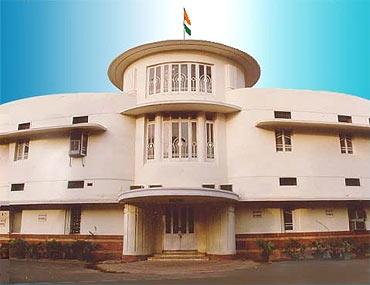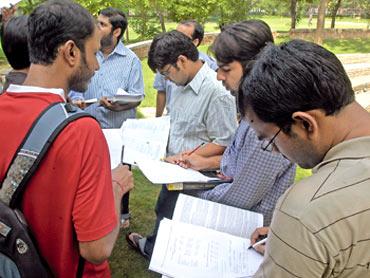 | « Back to article | Print this article |
Tips to crack Civil Services exam (Mains)
The Civil Services Main Examination 2011 is round the corner. It commences on October 29 and continues up to November 26, covering subjects like General Studies, Essay, English and Indian Language. Candidates have to choose two optionals from 55 different subjects.
This year about 880 vacancies have been announced across 24 services.
Owing to the change in the pattern of the preliminary examinations, aspirants were in for a surprise, while some of them were also confused. Although applicants prepared extensively, the UPSC set the paper in a surprising way, in both the General Studies papers. Particularly, it was observed that the coverage given to various areas in the syllabus followed an uneven pattern.
A lot of students must be wondering whether the Main Examinations will also follow suit.
Already there has been a perceptible change in the pattern of the questions appearing in the Mains -- whether it be General Studies, Essay or Optional Subjects -- based on an approach which favours study based on current trends and analysis. No matter, what the pattern is, or the subjects you choose, the questions will essentially test the candidate's social ethos and response.
Let us have a closerunderstanding of the approach that is required to excel in the Main Examination. Weshall start with the General papers, namely, General Studies (GS) and Essay. Scoring well in both these sections will determine your entry into the top civil services.
Click NEXT to continue
Read a newspaper, take down notes
There are two papers of 300 marks each. In the General guidelines given by the UPSC, it is stated that "the nature and standard of question in the General Studies papers will be such that a well-educated person will be able to answer them without any specialised study".
Although the syllabus prescribes many distinct areas like Indian Polity, India and the World, India's Economic interaction with the world, Social and Economic issues and so on, the questions asked are primarily from interlinked areas and mostly from current issues.
This implies that the aspirant should develop the habit of understanding things around in a logical manner and of expressing the ideas in a concise and analytical fashion. You can try some of these:
- Focussed reading of a standard English newspaper over a period of time can help achieve this trait. All areas in the syllabus except the Modern India portion and Statistical Analysis are enriched by this habit.
- A study of the basics of Indian constitution, Economic concepts and Indian Economic system, Indian Geography and concepts in Science and Technology shall go along with Newspaper reading for better clarity.
- The art of reading newspapers for the examination is a skill to be developed. You need to understand how you can concentrate only on themost essentialareas and discard the rest.You may also make notes to form a gist of the relevant material in a notebook.
- Matters are discussed in newspapers in a descriptive, analytical and argumentative fashion with issues at its backdrop. So, maintaining notes that are useful and contextual will help you in the long run. This will also ensure clarity of thought and communication.
- A look at the maps of India and World while reading will help develop better understanding of current affairs.
Click NEXT to continue
Time management is crucial
One should stick to the word limit given for each question. Achieving this requires lot of practice.
Ability to write to the point within the word limit in the alloted time is most important.
In 2010 examination, in paper I, the number of questions as per word limits were: 250 words (2), 150 words (14), 50 words (12), and 20 words (16).
In paper II, these were -- 250 words (2), 150 words (10), 50 words (17), 20 words (8) and remaining were from Statistical Analysis (31 marks). This pattern has remained unstable over the years. Sometimes, even 30 words and 100 words questions appear. On any standard, completing the paper requires a lot of precision and speed.
Questions being general and analytical, the ability to be precise by using minimum words, and to present it quickly and in a logical manner, assumes great significance here. Your approach to study should always take these crucial aspects into consideration.
Aspirants must also refer to previous year's question papers and syllabus thoroughly before laying hands on any study material.
Click NEXT to continue
Read NCERT books on Economy, Geography and Modern India
Plenty of study material is available in the market. One needs to choose wisely about which one to go for.
By subscribing to piles of books and study material, you may only add up to confusion. Remember, what we require is the maximisation of marks.
The examiner requires clarity of your mind. Reading simple and basic books and your own analysis of the information will help. Read NCERT books of Class XI and XII to get conceptual clarity on Polity, Economy, Geography and Modern India.
You may consult successful candidates for the approach and selection of the right material and simple standard books.
Newspaper reading coupled with analytic understanding will be the key to your scoring in many areas.
Group study can help in assimilation of the facts in a better analytical mode. You may form a group of four or five and discuss a list of topics regularly.
The advantages are many: you develop the commitment to study; you will be clear and analytical and learn the art of presenting the ideas in a group. At the same time, one topic gets enriched by many minds, thus adding to the vastness of perspective and ideas.
Through this brainstorming practice, a lot of facts and information will be registered in your permanent memory.
Click NEXT to continue
Set a target of 350 plus in General Studies
It is a time testing method for maximisation of score in the exam. We need to develop the habit of writing concisely, precisely and timely-in all the areas of the syllabus.
In particular, statistical analysis (in paper II) requires perfection of timing through practice. One cannot afford to lose the marks in this area.
One should identify the time limit for answering each question in the word limit. And we should not miss out even a single question due to paucity of time because a two mark lost from an easy 20 words question can be decisive.
It is time to start answering old question papers as well as mock tests for the current year.
One should set a target of 350 plus in General Studies. This is possible by following the techniques discussed above.
Many people walk into the IAS and other higher services on the strength of their score in GS. Applying the right strategies works wonders for this paper.
Click NEXT to continue
Do not choose abstract topics for essays
Essay paper is the trump card in the Main examination.
It appears simple but getting a decent score in this 200 marks paper is not that easy. Many of the aspirants might not have penned down an essay in their lifetime. But it is not a cause for worry.
The pursuits of comprehension, precision and articulation practised in the General Studies papers will help here. The style and flow will come through practice. We need to write a few essays before the examination, it is compulsory.
How much do you need to write?
You have three hours of time to write.
Going by reasonable analysis, 2500 words will be the ideal limit.
The logical sequence for essay writing would be -- introduction, discussion in the main body and conclusion. You need to use these wisely to impress the evaluator. That also means that you get a lot of lot of time to think over before writing.
Ideally, the first one hour can be spent on this thought process where the essay evolves strongly. Then we can create the flow of concise and logical expression.We can make a rough work, at the end of the answer book, in the first one hour, and score off.
Selection of the topic also matters. You will be given four to eight to choose from.
The choice is yours. These fall into various categories -- philosophy, culture, current political and economic issues, science and technology and so on.
Think well about which topic you can present with strong and logical points. It is better not to opt for abstract ones. It is always better to select a topic where you find solid and convincing features which you can shape up confidently. Present your ideas in simple and effective language.
Newspaper reading and group discussion will again help here. And there is no need to stress upon the importance of practice in this area. There is no short cut here, one has to do lot of writing practice. Write a number of Essays and get it evaluated.
For those who haven't tried their hands at writing an essay, you may start with the following two topics -- practice on these, by setting a time limit of three hours.
1. One Earth, One Chance
2. Probity in Public Life- A mirage?
Your aim should be to achieve 120 plus marks in this paper. If you reach this level or above, it will fetch you a good chance of success.
It will also compensate for any shortcomings in your optionals. Remember, many people who score very high in the optionals end up getting poor marks in this paper. This happens due to sheer neglect of this area and nothing else.
So, friends, your aim shall be to get minimum of 470 marks (350+120) in GS and Essay put together. Then scoring 650 in the optionals (with 350 in one) will help you enter the IAS in style, with a confident performance in the Interview (with a minimum score of 150 marks out of 300)
The author is a chief advisor and trains aspirants to appear for Civil Services examinations at various centres. He can be reached at hellogopa@gmail.com.





